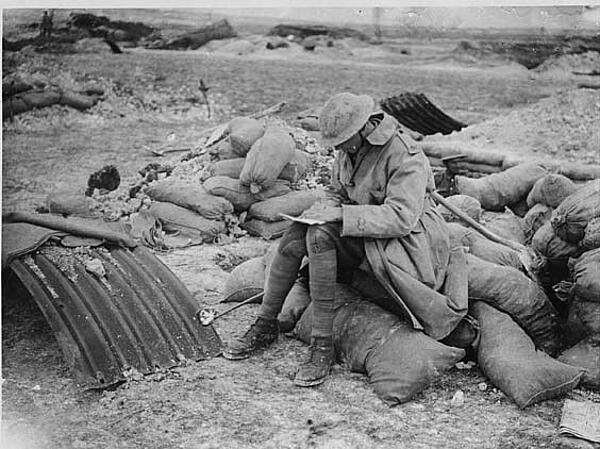Memories from the trenches
During the First World War, letter writing was the main form of communication between soldiers and their families, with around two billion letters delivered by the British Army Postal Service in wartime. In fact, in 1917 alone, more than 19,000 mailbags were sent across the Channel every day, containing letters and parcels destined for British troops fighting on the Western Front.
Soldiers dedicated much of their rest time to letter writing and the letters - from both sides - are arguably the only accurate source of information about what life was really like in the trenches. There were censorship guidelines in place that prevented full disclosure of sensitive information, but the soldiers regularly found ways to deliver the information they wanted to impart.

Receiving letters from home was also very important for morale, helping soldiers feel connected to their loved ones while they endured the horrors of trench warfare. These letters also provide a fascinating insight into what life was like during wartime for those who were waiting for their family members to return.
Thankfully, many of the letters written by soldiers and their families are still in tact today, with the majority of them held in museum archives.
Below are extracts of a few letters written from within the trenches, as well as some snippets from letters written by those who had managed to leave.
“Whilst asleep during the night, we were frequently awakened by rats running over us. When this happened too often for my liking, I would lie on my back and wait for a rat to linger on my legs; then violently heave my legs upwards, throwing the rat into the air. Occasionally, I would hear a grunt when the rat landed on a fellow victim.”
R L Venables
“To get a ‘cushy’ one is all the old hands think about. A bloke in the Camerons wanted a ‘cushy’ bad! Fed up and far from home he was. He puts his finger over the top and gets his trigger finger taken off and two more besides. “I’m off to bonny Scotland!” he says laughing. But on the way down to the dressing station, he forgets to stoop low where an old sniper is working. He gets it through the head.”
Robert Graves
"We must looked out for our bread. The rats have become much more numerous lately because the trenches are no longer in good condition. The rats here are particularly repulsive, they are so fat - the kind we call corpse-rats. They have shocking, evil, naked faces, and it is nauseating to see their long, nude tails."
Erich Maria Remarque
“We slept in our clothes and cut our hair short so that it would tuck inside our caps. Dressing simply meant putting on our boots. There were times when we had to scrape the lice off with the blunt edge of a knife and our underclothes stuck to us. “
Elizabeth de T’Serclaes - a nurse on the front line
“If you have never had trench foot described to you, I will explain. Your feet swell to two to three times their normal size and go completely dead. You can stick a bayonet into them and not feel a thing. If you are lucky enough not to lose your feet and the swelling starts to go down, it is then that the most indescribable agony begins. I have heard men cry and scream with pain and many have had to have their feet and legs amputated. I was one of the lucky ones, but one more day in that trench and it may have been too late.”
Harry Roberts
MLA Citation/Reference
"Memories from the trenches". HistoryLearning.com. 2026. Web.
